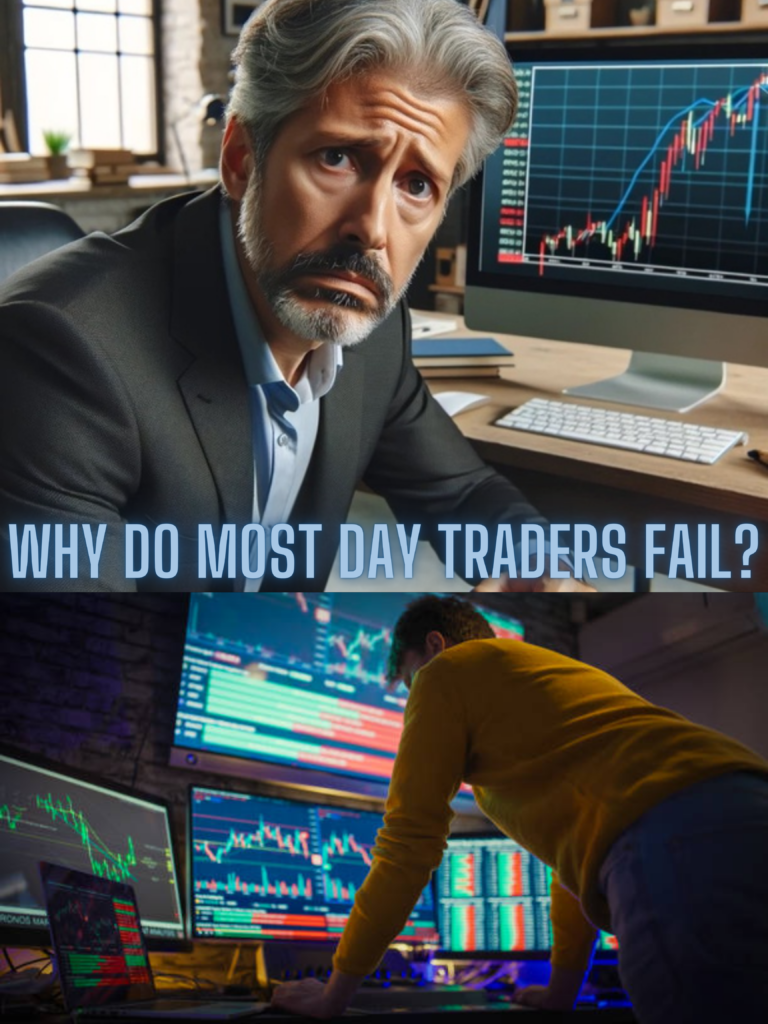Introduction:
Day trading, with its allure of quick profits and the promise of financial independence, has become an increasingly popular venture. However, the harsh reality is that a majority of day traders end up facing substantial losses rather than achieving the dreamed-of success. In this exploration, we’ll delve into 12 pivotal factors that shed light on why most day traders fail and how understanding these aspects can guide aspiring traders towards a more informed and strategic approach.

Lack of Education:
One of the fundamental reasons behind day trading failures is a lack of comprehensive education. Successful day traders invest time and effort in understanding market trends, technical analysis, and risk management. Without a solid educational foundation, traders are more likely to succumb to the complexities of the market.
Poor Risk Management:
Day trading involves constant decision-making, and failure to implement effective risk management strategies can lead to devastating consequences. Traders who don’t set stop-loss orders or allocate their capital wisely often find themselves in vulnerable positions, susceptible to significant financial setbacks.
Most Day Traders Fail due to Emotional Trading:
Emotional decision-making is the Achilles’ heel of many day traders. Fear, greed, and impulsiveness can cloud judgment and lead to impulsive trades. A disciplined mindset is crucial for successful day trading, as emotional decisions often result in losses.
Overtrading: Most Day Traders Fail
The allure of quick profits may tempt traders to overtrade, executing excessive transactions without a solid strategy. Overtrading often leads to increased transaction costs and a higher likelihood of making poor decisions.
Lack of Discipline:
Successful day trading requires a disciplined approach. Traders who deviate from their predetermined strategies or fail to stick to their trading plans are more likely to experience losses. Discipline is the key to consistency in the volatile world of day trading.
Inadequate Capital: Most Day Traders Fail
Insufficient capital is a significant hurdle for day traders. Without an ample trading fund, traders may struggle to diversify their portfolio, manage risks effectively, and absorb potential losses.
Unreasonable Expectations:
Day trading is not a guaranteed path to wealth, and setting unrealistic expectations can lead to disappointment and poor decision-making. Understanding the inherent risks and challenges of day trading is essential for maintaining a realistic outlook.
Ignoring Market Trends: Most Day Traders Fail
Successful day traders are adept at reading and interpreting market trends. Ignoring or misinterpreting these trends can result in misguided trading decisions, leading to financial losses.
Lack of Patience:
Patience is a virtue in day trading. Traders who lack patience may jump into trades prematurely, miss profitable opportunities, or fail to wait for the market to confirm their analysis.
Inadequate Technology and Tools:
In the fast-paced world of day trading, having the right technology and tools is crucial. Traders who lag behind in terms of equipment, software, and real-time data may find it challenging to compete effectively.
Inability to Adapt: Most Day Traders Fail
The financial markets are very dynamic and subject to constant change. Day traders who fail to adapt to evolving market conditions and adjust their strategies accordingly may find themselves at a disadvantage.
Lack of Continuous Learning:
Day trading is a continuous learning process. Markets evolve, new strategies emerge, and staying informed is essential. Traders who become complacent and fail to update their knowledge are more likely to fall behind.
Conclusion:
Understanding the factors that contribute to the high failure rate of day traders is a crucial step toward improving one’s chances of success. By addressing these challenges through education, discipline, and adaptability, aspiring day traders can navigate the intricate world of financial markets more effectively and increase their likelihood of achieving long-term success.
Answer Covered People also ask
1.Why do 90% of day traders fail?
2.Why do 95% of traders fail?
3.Why do people fail in day trading?
Disclaimer
This article has been created on the basis of internal data, information available publicly, and other reliable sources to be believed. The article may also include information which are the personal views/opinions of the authors. The information includes in this article is for general, educational, and awareness purposes only and is not a full disclosure of every material fact.
All the information on this website i.e. World Virtual CFO – is published in good faith and for general information purposes only. World Virtual CFO does not make any warranties about the completeness, reliability, and accuracy of this information. These are my views for only information purposes. Any action you take upon the information you find on this website (World Virtual CFO), is strictly at your own risk. World Virtual CFO will not be liable for any losses and/or damages in connection with using our website. For details please refer to our disclaimer page.
Dr. Dinesh Sharma is an award-winning CFO and AI strategist with over two decades of experience in financial leadership, digital transformation, and business optimization. As the founder of multiple niche platforms—including WorldVirtualCFO.com—he empowers professionals and organizations with strategic insights, system structuring, and innovative tools for sustainable growth. His blogs and e-books blend precision with vision, making complex financial and technological concepts accessible and actionable.
Comments are closed.